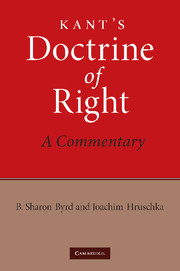Book contents
- Frontmatter
- Contents
- Introduction and methods of interpretation
- Chapter 1 The idea of the juridical state and the postulate of public law
- Chapter 2 The state of nature and the three leges
- Appendix to Chapter 2 Iustitia tutatrix, iustitia commutativa, and iustitia distributiva and their differences
- Chapter 3 The right to freedom
- Chapter 4 The permissive law in the Doctrine of Right
- Chapter 5 The external mine and thine
- Chapter 6 Intelligible possession of land
- Chapter 7 The “state in the idea”
- Chapter 8 The state in reality
- Chapter 9 International and cosmopolitan law
- Chapter 10 The “idea of public law” and its limits
- Chapter 11 Contract law I. Why must I keep my promise?
- Chapter 12 Contract law II. Kant's table of contracts
- Chapter 13 Criminal punishment
- Chapter 14 The human being as a person
- Appendix I to Chapter 14 On the logic of “‘ought’ implies ‘can’”
- Appendix II to Chapter 14 The system of rules of imputation
- Bibliography
- Index
Chapter 2 - The state of nature and the three leges
Published online by Cambridge University Press: 05 June 2012
- Frontmatter
- Contents
- Introduction and methods of interpretation
- Chapter 1 The idea of the juridical state and the postulate of public law
- Chapter 2 The state of nature and the three leges
- Appendix to Chapter 2 Iustitia tutatrix, iustitia commutativa, and iustitia distributiva and their differences
- Chapter 3 The right to freedom
- Chapter 4 The permissive law in the Doctrine of Right
- Chapter 5 The external mine and thine
- Chapter 6 Intelligible possession of land
- Chapter 7 The “state in the idea”
- Chapter 8 The state in reality
- Chapter 9 International and cosmopolitan law
- Chapter 10 The “idea of public law” and its limits
- Chapter 11 Contract law I. Why must I keep my promise?
- Chapter 12 Contract law II. Kant's table of contracts
- Chapter 13 Criminal punishment
- Chapter 14 The human being as a person
- Appendix I to Chapter 14 On the logic of “‘ought’ implies ‘can’”
- Appendix II to Chapter 14 The system of rules of imputation
- Bibliography
- Index
Summary
In this chapter, we continue our analysis of §41 of the Doctrine of Right, beginning with the state of nature, or non-juridical state, which is prior to the juridical state. To explain Kant's notions of the state of nature and the juridical state, section 1 will discuss Gottfried Achenwall's work, to which Kant expressly refers in §41. Although Kant disagrees with Achenwall's contrasting the state of nature to the social state rather than to the juridical state, Kant tacitly adopts Achenwall's distinction between “original” (ursprünglich) and “adventitious” (zufällig). Kant uses these two terms throughout the Doctrine of Right and understanding their significance is crucial to understanding that work. Indeed the distinction between “original” and “adventitious” elucidates what Kant means with the three leges, namely the lex iusti, the lex iuridica, and the lex iustitiae, in §41. Those leges will be fleshed out in sections 2 and 3, where we provide a detailed explanation of Kant's use of them. In section 4, we argue that understanding the three leges as we claim they should be understood explains Kant's discussion of the three Ulpian formulae, honeste vive, neminem laede, and suum cuique tribue. In particular, it explains what has been considered to be a cryptic comment Kant makes at the end of his discussion of the Ulpian formulae regarding internal legal duties, external legal duties, and those legal duties which contain the derivation of the external legal duties from the principle of the internal legal duties through subsumption.
- Type
- Chapter
- Information
- Kant's Doctrine of RightA Commentary, pp. 44 - 70Publisher: Cambridge University PressPrint publication year: 2010



